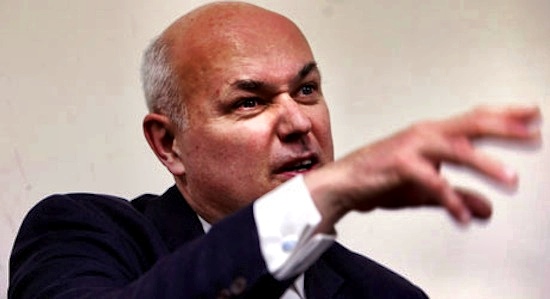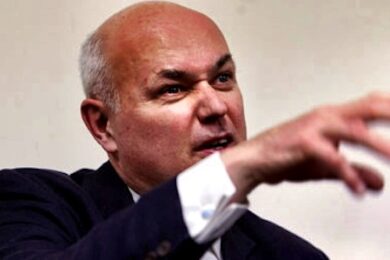The severity of Mick Philpott’s crimes barely need repeating. They are as heinous as it is possible to imagine.
But now they are being used to provide cover for a government intent on winding back the very basis of the system that should, by design, prevent people starving. They are being used to provide cover for murderous gains on the part of capital. These gains have killed many more than Philpott did.
Last year more than 1,100 people died after their incapacity benefit was rescinded because they had been proclaimed fit to work. Two months ago Daniel Gauntlett, a 35 year old homeless man, froze to death on the porch of an abandoned property because he did not want to break new laws preventing him squatting in it. In June 2012 a coroner found that one contributing factor in the suicide of Carl Payne, a 42 year old father of two, was worry over possible changes to his incapacity benefit. In September of that year Brian McArdle, a 57 year old man who had suffered a stroke so severe that he was paralysed on one side, blind in one eye, and unable to speak, eat, or dress for himself, died following news that he had been declared "fit to work".
What Mick Philpott did is beyond comprehension. What the government is doing is beyond belief.
It is not surprising that the government has jumped on Mick Philpott in this way. There is nothing new about the exploitation of a tragedy by either the press or the state. One need only look at contemporary coverage of Jack the Ripper for an illustration of the media’s predilection for sensationalising. But there are aspects of the coverage of the Philpott case that are uniquely disturbing, and which we can only understand within the context of a broader anti-working class narrative that has grown steadily since the 1970s.
Philpott has been seized on by politicians not purely because of the appalling nature of his crimes, but because of the way in which they reinforce this narrative – one of the undeserving poor, of a scrounging underclass, of a feral mass leeching away the country’s economic life. This is amongst the primary means by which the working class has been relieved of its meagre gains, and by which it is ensured that it remains unable to name, let alone fight, its oppression.
The decomposition of the working class has been the great victory of neoliberalism. The very notion of an organised working class seems anachronistic; a cute throwback that gave us nothing but electricity rationing. The defanging of the unions is well-documented, but their utter flaccidity seemed to be illustrated most glaringly last March when, in the face of the wholesale destruction of the NHS, Unison and the TUC called not for industrial action, but for a candle-lit vigil. It was the hollowest gesture imaginable; the ultimate instantiation of the unions’ irrelevance. With each opportunity for confrontation, unionised labour seems to inch closer to oblivion.
But these protracted death rattles are only half of the story. The assault on the working class has not only been enacted through decades of anti-labour legislation, nor solely through the betrayal of the unions. While losing the war on these fronts, the working class also has been subjected to a vicious cultural assault; an assault that insists they are either to be distrusted or gawped at.
In his book Chavs: The Demonisation of the Working Class, Owen Jones documents many of the most unpleasant weapons in this assault. He writes about Gymbox’s ‘Chav Fighting’ classes, and tour companies’ ‘Chav-Free Activity Holidays’. He persuasively catalogues the means by which the working class has been reduced to a mass of "knuckle-dragging thugs lacking legitimate aspirations", good for nothing but fighting and being fought.
The Philpott case is as manna for those who would paint the working class as barbaric manipulators. At its heart is a horrendous man who was adept at playing the system – the default position, we are led to believe, for welfare claimants. Those on benefits are set up by government and press as the blinds-pulled-at-10am scroungers lounging in prostrate opposition to Nick Clegg’s laughable ‘alarm clock Britain’. This is, of course, nonsense. The majority of benefit claimants are in work. The total rate of benefit fraud runs to a negligible 0.7 per cent. The Department for Work and Pensions estimates that overpayments or underpayments made as a result of its own errors are equivalent to roughly three times the total paid out as a result of fraudulent claims. Benefit fraud is a political priority not because of its economic impact, but because it provides supposed grounds for a purely ideological welfare retrenchment.
The tendrils of the case also hit on many of the other classic touch-points for anti-working class discourse. The screeching coverage has positively revelled in laying bare the "degeneracy" of the Philpotts’ living situation. Editors have luxuriated in the man’s unusual living arrangements. The BBC dedicated a thousand words to the vague suggestion that polyamory may have been the basis for his crimes. As blogger Zoe Stavri points out, the BBC would seemingly rather insinuate that this unconventional but not uncommon practice is to blame than to acknowledge that Philpott was simply a domestic abuser.
Reality television must surely bear some responsibility here, and not only for having fed the ravenous ego of a man who clearly thrived on power via his appearances on Jeremy Kyle, itself an exploitative cartoon. Philpott’s appearance on the toe-curlingly titled Ann Widdecombe Versus The Benefits Culture, shot five years before the crime for which he is likely to now spend the rest of his life in prison, has become the primary reference point for this poverty porn journalism. Consider the vulgar joy with which publications have reproduced images of Philpott’s now-infamous caravan. This remains the overriding mode of public discourse about the poor.
The two strands of this discourse now seem increasingly clear. The unrestrained, unapologetic bigotry that Jones catalogues certainly remains. But on the other hand there is a more insidious denigration, sheathed under a layer of faux concern. This takes the form of programmes like The Secret Millionaire, or Plan B’s ill-advised public proclamations; shows and articles that treat the working class as ‘noble savages’ awaiting redemption. Invariably, the solution posited here is that the poor should become middle class, either through some vague notion of honourable hard work, or through the generous largesse of the rich. These two strands are equally damaging. They conceive of the working class subject either as one who has chosen poverty, or as an inevitable phenomenon arising not for systemic reasons but from a quirk of humanity. They resolutely fail to challenge it as a category, fail even more dramatically to acknowledge it as a function of capitalism – as a necessity for the perpetuation of a mode of production that relies on exploitation.
This discourse has provided vital cover for the extraordinary, egregious gains that capital has enjoyed over the past four decades. Philpott is politically useful because he provides a totemic figure – yet another item in a long litany of means (some subtle, some less so) by which the state has set the middle class against the working class, and the working class against itself. We must not allow the deaths of those six children to be used as justification for yet more deaths.



